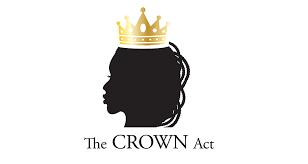Opinion by Tayo Bero
A Texas court is set to decide next month if one of its school districts can continue to punish a Black teenager for refusing to cut his locs.
Since last August, 18-year-old Darryl George has been kept out of his regular classroom at Barbers Hill high school in Mont Belvieu while he served in-school suspension and faced other disciplinary action because of his hair.
Related: Why do Black female artists still have to fight for respect in Hollywood? | Tayo Bero
According to CNN, the Barbers Hill independent school district forbids male students from wearing their hair in a style “that would allow the hair to extend below the top of a t-shirt collar, below the eyebrows, or below the ear lobes when let down”. George’s long dreadlocks, which he keeps woven together in a protective style on top of his head, supposedly violates that dress code.
Why Is Black Hair Political?
Black children shouldn’t have to litigate the hair that grows out of their head. I’m a Black woman who also has locs and is all too aware of the ways that my own appearance is often scrutinized. That this teenage Black boy will have to fight in court for his right to his own hair shows just how far traditionally white authorities will go to exert control and reinforce meaningless status quos.
Take this court case itself. We’ve only arrived at this point – a full-blown trial – because the school district, rather than respond with accountability to the public outcry about George’s suspension, doubled down on its stance by filing a lawsuit to determine whether its dress code was in violation of the Crown Act, a law that protects Black people from discrimination on the basis of their hair.
Black hair discrimination is as old as Black presence in America itself, and it’s taken various creative forms throughout history. Today, locs, braids, afros and other textured hair types continue to be made political because of the ways western society privileges straight hair, and disparages and denigrates Black hair.
Why Is Black Hair Political?
This endless debate over Black hair is also indicative of a larger systemic erasure of Black identity from public life. Companies enforcing dress codes that effectively tell Black employees they can’t come to work without changing their appearance, Black girls being forced to “tame” their hair for school or work, Black boys having their locs viciously shorn in front of hundreds of their peers – all of it amounts to the not-so-subliminal messaging that Black people can’t truly be a part of society unless they chase white supremacy’s ever-shifting goalposts of cultural compliance.
In a full-page ad taken out in the Houston Chronicle earlier this month, Barbers Hill’s superintendent, Greg Poole, defended the school dress code, adding that “being an American requires conformity”.

And there it is – the underlying idea that anything that bleeds outside the lines of Eurocentric normativity is inherently un-American and therefore a “danger” to American society that needs to be taken care of. It’s a logic that simultaneously reinforces the “other”-ness of Black Americans and justifies the endless state-sanctioned violence that’s done to them.
Related: The Politics of Black Hair
“I love my hair, it is sacred and it is my strength,” George wrote in a recent affidavit. “All I want to do is go to school and be a model student. I am being harassed by school officials and treated like a dog.”
His words are haunting.
White children are allowed to grow up without having their bodies – their literal hair and skin and features – become a testing ground for political debate. Black children deserve to have that too.
